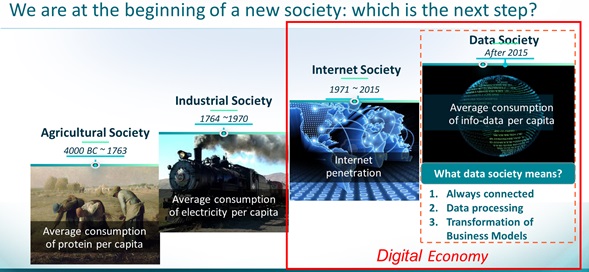 José Ignacio Tortosa
José Ignacio Tortosa
On November 17th, Mr. Carlos López-Blanco participated in the annual Digiworld Summit held in Montpellier.
During his intervention in the plenary session, in the panel named “What role will telcos play? Monetize data or serve as trusted third parties? Mr. López-Blanco brought the role of trust as an opportunity for telcos, and the need to provide a safe environment in the digital world.

If we look at our civilization with perspective, we can associate every step in the development with a different parameter that determines the apparition of a new society and the level of development inside it: the agricultural society (4000 b.C.–1763) with the average of consumption of protein per capita, the industrial society (1764-1970) with the average of consumption of electricity per capita, and the internet society (1971-2015) with the internet penetration that characterizes it.
Mr. Lopez-Blanco asked if with the internet penetration close at hand, are we at the beginning of a new society? are we living a new revolution? It is true that we are living new ways to meet demands of consumers, what we call the Digital Economy. Digital economy is a challenge for any business, but this is not only because of technology; it is true that can affect technological business, for example to telcos vs new services such as WhatsApp, but Digital Economy’s essence is not in the technology. It is the way of doing things: we can see it in traditional sectors, as hotels vs companies such as airbnb, media companies vs Netflix, Banks vs PayPal… which also allow starting in the same position to developed or emerging countries, or growing/in crisis economies.
Mr. López-Blanco concluded that we are in a true revolution that will bring a new society. How can we call this New Society? If we study what is really new in our world, we can realize that the huge generated and processed data, are in the core of the transformation of current business models. The “always connected” premise signifies a huge source of information that it is increasing every day. All this information is currently processed and will be “more” processed in the future: the current 80 exabytes of data processed, will be 800 exabytes processed in 2020, ten times more in only 5 years (1 exabyte represents 1018 words = the biggest library in the world).
Also in liquid money, Mr. López-Blanco confirmed the preeminence of data in our days:
- why facebook paid $19 bn (2014) or Microsoft paid $26 bn (2016) for companies that did not make any money? (WhatsApp, Linkedin)
- why Google invests 3 times more money in data centers than 4 years ago? ($7.5 bn/2016)
This is why, Mr. López-Blanco call this society, the Data Society, and that the info-data per capita will characterize this new society, such as the consumption of protein characterized the agricultural society, or the consumption of electricity characterized the industrial society.
All this data comes from our “digital life”, which is life itself: our “digital live” shows what we like, what we do not like, our preferences, our friends, our way of thinking… and can be used for good. From many perspectives, data can enrich customer’s lives and benefit society. Data can help in pandemic diseases information or prevent the crime, increase the services efficiency in transport, emergency services, cities, economy statistics… But data also generates fears, sometimes for good reasons: hackers’ attacks, identity theft, data leaks…
Even when a digital service fulfills the requirements of legal Terms of Service, the solution is really imperfect. For instance, in a University study, 98% of students gave gladly consent to provide their first-born child as payment for a digital service offered in the University; in this study the Terms of Service average reading time was estimated in at least 15 minutes!.
These fears make management of data taken a prevalent role to the public agenda. Issues as portability, right to be forgotten, explicit opt-ins, data sovereignty, public security… related to privacy and securing, are appearing in the legislation worldwide, and Europe has taken the initiative with the General Data Protection Regulation, in force from May 2018.
Is there any space for Telco operators in this new society? Which could be the Telco companies’ proposal? Mr. López-Blanco stated that it could be based in two basis:
- Manage our own data space. We are in different business than the OTTs, and we so we can have a different approach; we are in different position on consumers´ data, since we do not need to sell them, since customers already pay us for our services.
- Give value and get trust. Our customers want value for their personal data, together with confidence: we want to be a trusted 3rd party.
Mr. López-Blanco, said that Telefónica believes in “Giving the Data Back to Customers”; the customers should have the choice: protect his privacy or stop being tracked, for digital introvert customers, or favor to engage with brands they love with or to receive rewards and incentives, for digital extrovert customers.
He also noted that Telefónica does not expect to get direct money from this, since customers already pay for our services, but we are sure we will get benefits: less churn, engagement, perception that favor our relationship to customers and our brand. Also, not all the customers are the same, and Telefonica also aims at helping business customers to take advantage of their data through his new Big Data unit named Luca.
To end, Mr. López-Blanco told that all this Telefónica strategy, keeps the customer at the center: Telefónica wants customer keeps the control over his digital life, with the biggest trust, privacy and security.






